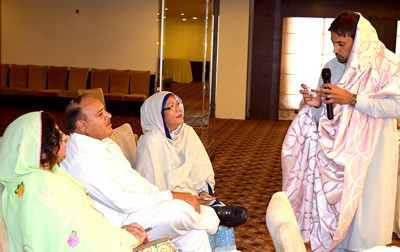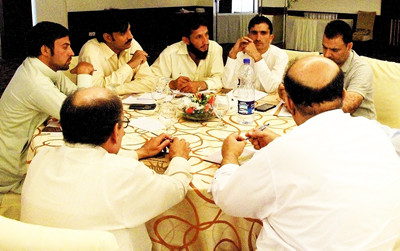Sexual Harassment in the Workplace | Training to “Identify - Stop - Prevent”
Date:
Due to the harsh work environment in Pakistan, it is difficult for women to contribute to their country's economic development. Women commonly face inappropriate behavior and harassment on the streets, at the work place and in public places. If they report it, they are often stigmatized or looked down upon by society, and unfortunately often by their own family as well. Practices of blaming the victim and doubting a woman’s intention of reporting are common, and intimidates women into keeping quiet.

This is the biggest obstacle to the Pakistani government’s efforts to increase the number of women employees; where even the minimum quota of 5 per cent for women remains unfilled. Those who do come out to work, have to fight for their rights and get little support to carry on.
Six years ago, no law in Pakistan covered sexual harassment in the workplace. The issue was brought to national attention through a campaign spanning a decade and resulted in passage of Pakistan’s first Protection against Harassment of Women at the Workplace Act 2010. This simultaneously became a law that was extended to the whole of Pakistan.
In addition to women, men are also exposed to harassment on the streets, at the work place and in public places. However, it is not easy for uneducated women and men to know their rights unless they are made aware of them.
UN Women in collaboration with the Embassy of Denmark, under its Women’s Leadership in Social Reconstruction programme supported the Government of Khyber Pakhtunkhwa to bring district officers from all the districts of the Province and train them as master trainers to effectively implement the workplace sexual harassment legislation. Dr. Maliha Hussain of Mehergarh, a non-governmental organization was the lead trainer.

Photo: Mehergarh
Speaking during the 3-day training, Ms. Tahida Naveed, from Peshawar stated: “This course makes me feel like I have gained confidence to approach harassers [male and female], as I now know my rights and how to defend myself with the law in my hand. Further, it has given me a proper platform to train others, and create awareness of the issue and employees’ rights”.
Ms. Salma Nasrullah, a Social Welfare Officer for disabled people said: “This type of training is extremely important for vulnerable groups who might get harassed more than others; we need to raise our voices, and through this training I can help to raise the voices of those who normally are not heard”.
Mr. Tajuddin from Chitral shared; “I was misunderstanding the law, and was not aware of the fact that Pakistani men can get harassed too. I have now learned that the law protects the rights of men as well. This was very surprising to many of us!” He further explained; “In our patriarchal society and culture men are supposed to be powerful, therefore to say a man has been harassed is a taboo and most people do not talk of it”.

With representation from 25 districts of Khyber Pakhtunkhwa (some from rural and far flung areas) the master trainees developed action plans to implement the Anti- Sexual Harassment Act in their respective districts. These master trainers will oversee implementation by providing training to members of the Anti-Sexual Harassment Committees as well as orientation to staff of different government departments and organizations. Ms. Tahida who is ready with her plan in hand said with great enthusiasm: “I am especially interested in approaching the local police station to propose trainings for police officers. It may not be welcome, but at least I will try”.
The training held on 14-16 September 2015 in Islamabad, was inaugurated by Ms. Sangeeta Thapa, Deputy Country Representative for UN Women Pakistan, while the certificate distribution and closing ceremony was presided by Mr. Jamshed Kazi, Country Representative for UN Women Pakistan, along with Mr. S. Hidayat Jan, Secretary for Social Welfare & Women Empowerment Department of Khyber Pakhtunkhwa and Mr. Arif Tabassum from the Danish Embassy.
For more information contact:
UN Women Pakistan
Ms. Faria Salman Email: faria.salman@unwomen.org
Ms. Henriette Bjoerge Emai: henriette.bjoerge@unwomen.org